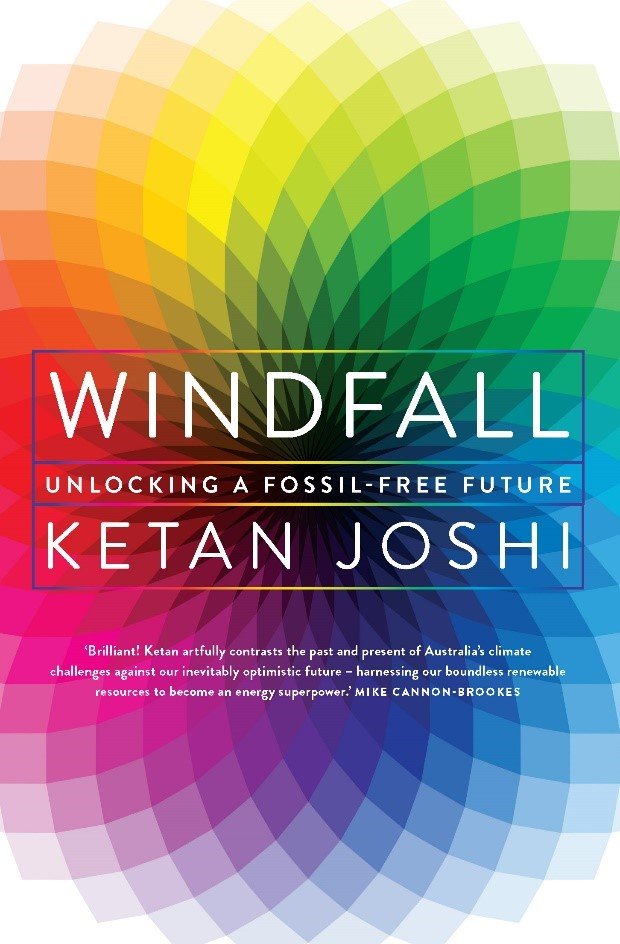Review: Windfall by Ketan Joshi
*A version of this post was first published by Underground Writers November 29, 2020
Title: Windfall: Unlocking a fossil-free future
Author: Ketan Joshi
Publisher: NewSouth Books
‘Australia’s new decade has opened with the static anxiety of helplessness as the dual disasters of fire and disease dominated our hearts, and so it is more vital than ever to know we can fight to control our fate.’
I don’t usually get super excited about non-fiction books, but when science and technology journalist Ketan Joshi announced that his debut book Windfall was coming out I was immediately hooked by its premise. Why, with all evidence pointing in the same direction, do climate denialists still exist? Why, when renewable alternatives exist, are we still building coal and gas plants? Why, when scientists have been begging for action since the seventies, have we been so slow to engage in meaningful change? Joshi sets out to answer these questions in Windfall, looking at the social, political, and economic factors that have led to our current climate crisis and, more importantly, how we can ensure a stable climate for future generations.
Joshi is consistently thorough in his presentation—everything is meticulously researched, with a reference list at the end that goes for 24 pages, including research papers, government policy, news stories, and broadcasts. He trusts the reader to keep up; in one chapter giving a detailed outline of the mechanics behind power grids in order to explain how the South Australian blackout was manipulated to create an anti-renewable energy discourse. If you’re a stickler for the particulars, this book will quench your appetite. However, if the thought of in-depth detail seems bland to you, rest assured Joshi balances this all with his engaging writing—a satisfying mixture of science and politics. Calling on well-known, as well as lesser-known stories, he explains how and why information is manipulated in order to increase support for the ‘slow-and-steady’ argument for change.
While it may seem that this book is one for the average individual, it is also a timely message for activists, politicians, corporate bodies, and the renewable industry itself. Joshi outlines how pseudoscience is used to bog climate-activists in arguments that aren’t worth having, how loopholes in the law allow tactics of intimidation for those who speak out against fossil fuels, how capitalist economics lead to feelings of community disempowerment, how politicians like Tony Abbott and Scott Morrison use distraction to encourage inaction, and why all of this needs to be addressed to see genuine change.
These big-picture discussions are comfortably juxtaposed with Joshi’s recollections from his own time working in the renewable sector. Using stories of success and failure from around the world, he looks back on his time in the industry, applying what he’s learnt to try and assess where his own efforts succeeded and failed. In one particularly memorable chapter he is unflinchingly honest in admitting his own mistakes. He says, ‘We were so invested in winning battles that we never asked why we were fighting in the first place,’ before going on to say, ‘… the forgetting of this fact [not everyone wants to live near a wind farm] by people like me, advocating so strongly for more renewable energy, bears so much responsibility for the escalating silliness that stifled Australia’s renewable energy growth through the 2010s.’ Looking back at the approaches of renewable energy firms in other countries, he ascertains what he would have done differently, and what needs to be done to see movement going forward.
While it may sound to the renewable-energy supporters among us like a mildly depressing read—being confronted with the corporate and political battles that seem impossible to overcome—Joshi is deliberate in his desire to be positive about the capacity for change in the coming decades. Each chapter highlights an area for improvement at corporate, scientific, government, and personal levels. While he must first delve into the issues of the past, Joshi always ends on a decisive and positive note using his conclusions as an opportunity to talk about how things are already starting to change and how the reader can help to drive the climate change movement further.
Windfall is as much a call to arms as a chance to set the record straight. It’s a call for the reader to engage with and support those parties and businesses who work towards meaningful change. Ketan Joshi attempts to fight the rising tide of ‘doomism’ which he describes as just as infuriating as denial. Doomism is comfortable. Like denial, it means you don’t need to do anything. But we are closer than ever to implementing the changes we need and as Joshi says in his opening: ‘Every problem is insurmountable before it is surmounted. Every change is slow before it is fast. Every apocalypse is inevitable until it is cancelled.’ It is essential reading for Australians engaging in the climate-change movement.

